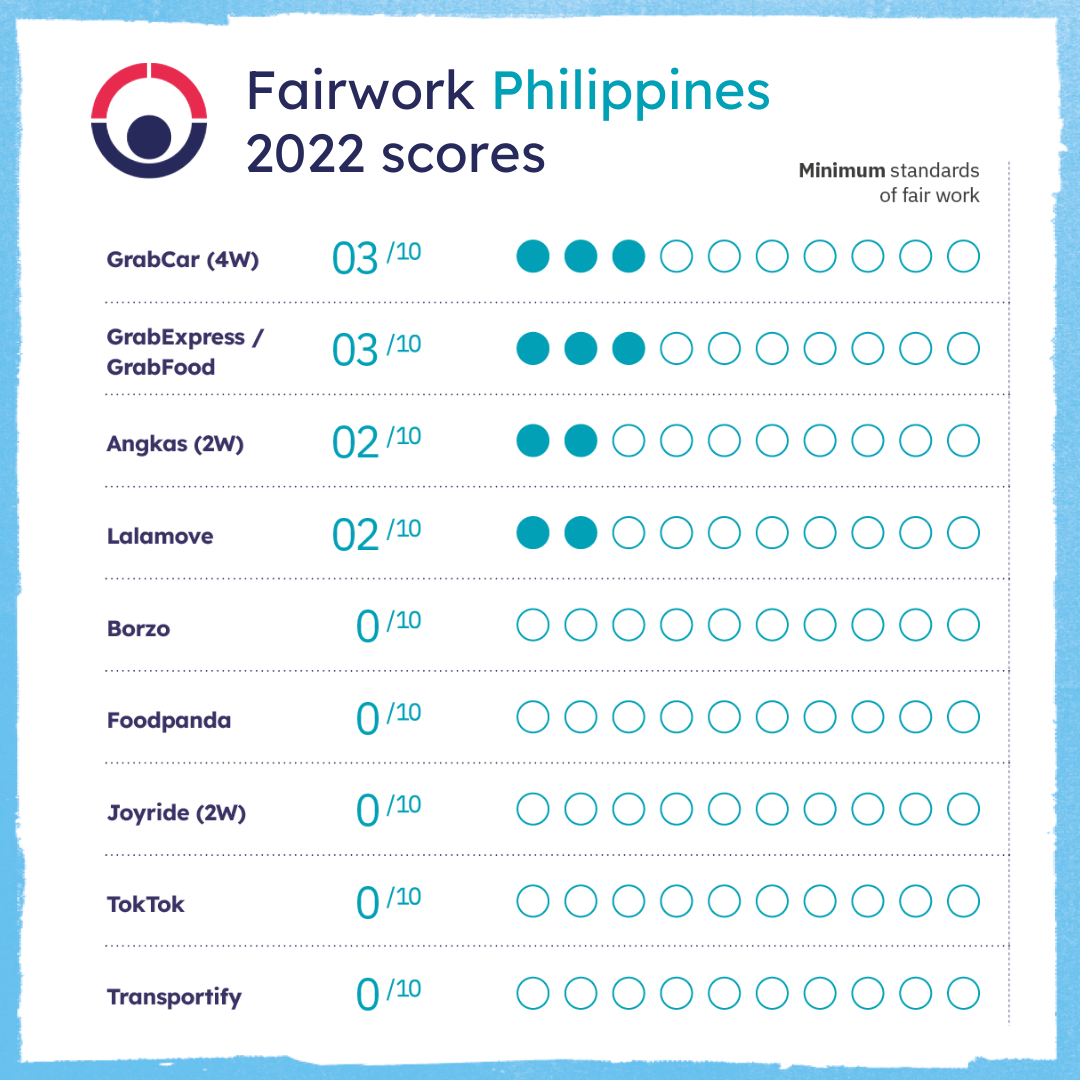New Fairwork Philippines report reveals best and worst practices in gig economy

More than 400,000 riders and drivers in the Philippines work in the gig economy, but a new report from Fairwork Philippines and De La Salle University Manila says many of these workers face low pay and dangerous conditions.
Nine of the most popular gig economy platforms in the Philippines have been rated according to how fairly they treat workers. The Fairwork Philippines 2022 report ranks platforms against five principles of fair work, giving each company a score out of ten. The report finds that the majority of the nine platforms could not show they meet basic standards of fairness when benchmarked against the Fairwork principles.
Grab Car and Grab Express topped the ranking with only 3 points out of 10, followed by Angkas and Lalamove with 2 points each. The study found that most other companies, such as Joyride, Foodpanda, TokTok, Borzo, and Transportify could not evidence any of the minimum standards of fair work – such as ensuring all workers earn above the national minimum wage. This is the first study of its kind in the Philippines, scoring companies on labor standards such as pay, conditions, contracts, management and representation.
Dr. Cheryll Ruth Soriano of De La Salle University and lead researcher said:
“For the first time, we have looked at companies offering transportation, food delivery, courier and logistics services to rate them on how they treat their workers. The ratings provide a helpful guide for both regulators and customers who use these platforms. In this report, we found Grab is the highest scoring platform as it offers its workers, although considered as independent contractors, mechanisms to mitigate task specific risks such as emergency assistance and free accident insurance, and was found to have basic fair contracts and fair management mechanisms.”
The research also found that Grab offered a variety of support programs such as GrabCare Package that included hospitalisation, education, calamity, or burial assistance; and Grab Bayanihan to help mitigate income losses during the lockdowns. However, Grab could not evidence minimum standards for fair pay and fair representation.
The report findings indicate that while the gig economy continues to grow and attract Filipino workers whose livelihoods depend on platforms, the absence of clear regulatory standards for the gig economy in the Philippines translates to less than fair conditions for workers. The provision of social support and safeguards becomes a prerogative rather than a standard by which gig work can be facilitated by platforms, resulting in unequal conditions.

Key Findings
Fair Pay: None of the nine platforms demonstrates their workers are guaranteed to be paid the minimum wage after costs.
Fair Conditions: Only four out of the nine platforms (GrabCar, GrabFood/Express, Angkas, and Lalamove) provide sufficient protection from the task-related risks in their daily work.
Fair Contracts: Only four out of the nine platforms (GrabCar, GrabFood/Express, Angkas, and Lalamove) showed evidence of clear and accessible contracts or terms of service.
Fair Management: Only two of the nine platforms (GrabCar & GrabFood/Express) have a formalized process where workers can appeal decisions.
Fair Representation: None of the nine platforms allows for collective representation of workers.
By publishing this study, Fairwork Philippines are calling for stronger protections and more robust labor standards in the Philippines’ platform economy. Their report shows deplorably low scores across most platforms, showing that there is much to do to improve the condition of workers in the ride-hailing and food and courier express delivery sectors.
Don Pangan, secretary-general of Kapatiran ng Dalawang Gulong (KAGULONG), an organization advocating and promoting rider and labor rights and the social protection of two-wheel riders in the gig economy, said:
“What we are demanding is for the government to intervene and identify the employment relationship or set the standards because this industry is new in our country.”
The Department of Labor and Employment issued Labor Advisory No. 14 in July 2021 to determine the employment relationship between food and delivery riders and service-oriented platform companies. Former Labor Secretary Silvestre Bello III said that “workers who are considered employees are entitled to benefits.” However, riders engage with platforms as independent contractors.
The Fairwork Pledge
As part of Fairwork’s commitment to holding platforms accountable for their labor practices, the Fairwork Pledge was also introduced in the Philippines. The pledge aims to encourage other organizations, such as universities, companies and investors, to announce their public support for decent working conditions in the platform economy, guided by the five principles of Fairwork.
Prof. Mark Graham, Professor of Internet Geography at Oxford Internet Institute and Director of Fairwork, said:
“The low scores of many popular platforms in the Fairwork Philippines league table clearly demonstrates the need for regulatory intervention to ensure gig workers are no longer falling through the cracks, further exacerbated through the pandemic. As part of our vision for a fairer future of work, we’re setting out a pathway to realize that ambition through the launch of the Fairwork Pledge. We urge organizations and investors to sign up to the pledge today and help our vision of fair work become a reality for all platform workers.”